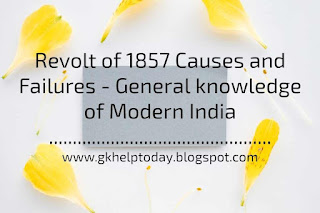General knowledge of Modern India : The Revolt Of 1857 was the result of military discontent and mass revolt against the British takeover in northern and central India. Incidents of military discontent such as arson in the cantonment area had started from January itself, but later in May these sporadic incidents took the form of a widespread movement or rebellion in the area concerned. This rebellion put an end to the rule of British East India in India and paved the way for bringing much of the Indian subcontinent under the direct rule of the British Government (British Raj) for the next 90 years.
Causes & Failure Of The Rebellion General Knowledge
The use of greased cartridges and the issues related to soldiers were considered as the main reason for this rebellion, but by the present research it has been proved that the use of cartridges was neither the only reason nor the main reason for the rebellion. In fact, this rebellion was a combined result of many reasons like socio-economic-political-religious etc.
Social and Religious Reasons:
The British passed Acts like the Abolition of Sati (1829) and Hindu-Widow Remarriage (1856) by moving away from the policy of not interfering in the socio-religious life of Indians. Christian missionaries were allowed to enter India and preach religion. The traditional laws of Hindus were amended by the Religious Disability Act of 1950. Father's property cannot be deprived of.
Economic reasons:
British rule ended rural self-reliance. The commercialization of agriculture increased the burden on the peasantry. Apart from this, factors like adopting free trade policy, discouraging the establishment of industries and outflow of money completely destroyed the economy.
Military reasons:
The expansion of the British colony in India badly affected the working conditions of the soldiers. They were provided appointments away from their homes without paying any additional allowances. An important reason for military discontent was the General Service Enlistment Act, It was 1856, by which it was made mandatory for the soldiers to cross the sea when required. The free postal facility available to the soldiers was also withdrawn by the Postal Office Act of 1954.
Political reason:
The last expansion of British territory in India took place during the reign of Dalhousie. Dalhousie announced in 1849 that the successors of Bahadur Shah II would have to leave the Red Fort. The annexation of Baghat and Udaipur was annulled by any means and they remained under their ruler-houses. When Dalhousie tried to apply the principle of lapse to Karauli (Rajasthan), his decision was overturned by the Court of Directors.
Various leaders associated with the Revolt of 1857
- Barrackpur - Mangal Pandey
- Delhi – Bahadur Shah II, General Bakht Khan
- Delhi – Hakim Ahsanullah (Chief Advisor to Bahadur Shah II)
- Lucknow – Begum Hazrat Mahal, Bijris Qadir, Ahmadullah (Advisor to the former Nawab of Awadh)
- Kanpur - Nana Sahib, Rao Sahib (Nana Sahib's nephew), Tantya Tope, Azimullah Khan (Nana Sahib's advisor)
- Jhansi – Rani Laxmibai
- Bihar (Jagdishpur) – Kunwar Singh, Amar Singh
- Allahabad and Banaras – Maulvi Liaquat Ali
- Faizabad - Maulvi Ahmadullah (he declared the rebellion as jihad against the British)
- Farrukhabad – Tufzal Hasan Khan
- Bijnor – Mohammad Khan
- Moradabad – Abdul Ali Khan
- Bareilly – Khan Bahadur Khan
- Mandsaur – Firoz Shah
- Gwalior/Kanpur – Tantya Tope
- Assam – Kandapareshwar Singh, Maniram Dutta
- Orissa - Surendra Shahi, Ujjwal Shahi
- Kullu – Raja Pratap Singh
- Rajasthan – Jaidayal Singh, Hardayal Singh
- Gorakhpur – Gajdhar Singh
- Mathura – Sevi Singh, Kadam Singh
British Officials Related To The Rebellion
- General John Nicholson - Captured Delhi on September 20, 1857 (Nicholson died soon after due to wounds received in battle.)
- Major Hudson - Killed Bahadur Shah's sons and grandsons in Delhi.
- Sir Hugh Wheeler - Faced Nana Sahib's army till 26 June 1857. On 27th the British army surrendered after receiving assurance of safe passage from Allahabad.
- General Neel - In June 1857, Banaras and Allahabad were recaptured. In retaliation for the killing of the British by Nana Sahib's army, he killed the Indians in Kanpur. He died in Lucknow during the struggle with the rebels.
- Sir Colin Campbell - He finally captured Kanpur on 6 December 1857. Finally captured Lucknow on 21 March 1858. Retrieved Bareilly on 5 May 1858.
- Henry Lawrence - Chief Administrator of Oudh, who was assassinated by the rebels on 2 July 1857 during the capture of Lucknow Residency.
- Major General Havelock - defeated Nana Sahib's army on 17 July 1857. He died in Lucknow in December 1857.
- William Taylor and Eyre - Suppressed the revolt at Arrah in August 1857.
- Hugh Rose - Suppressed the rebellion in Jhansi and recaptured Gwalior on 20 June 1858. He brought the whole of Central India and Bundelkhand under British rule again.
- Colonel Onsel - Captured Banaras.
Tags
Modern India

